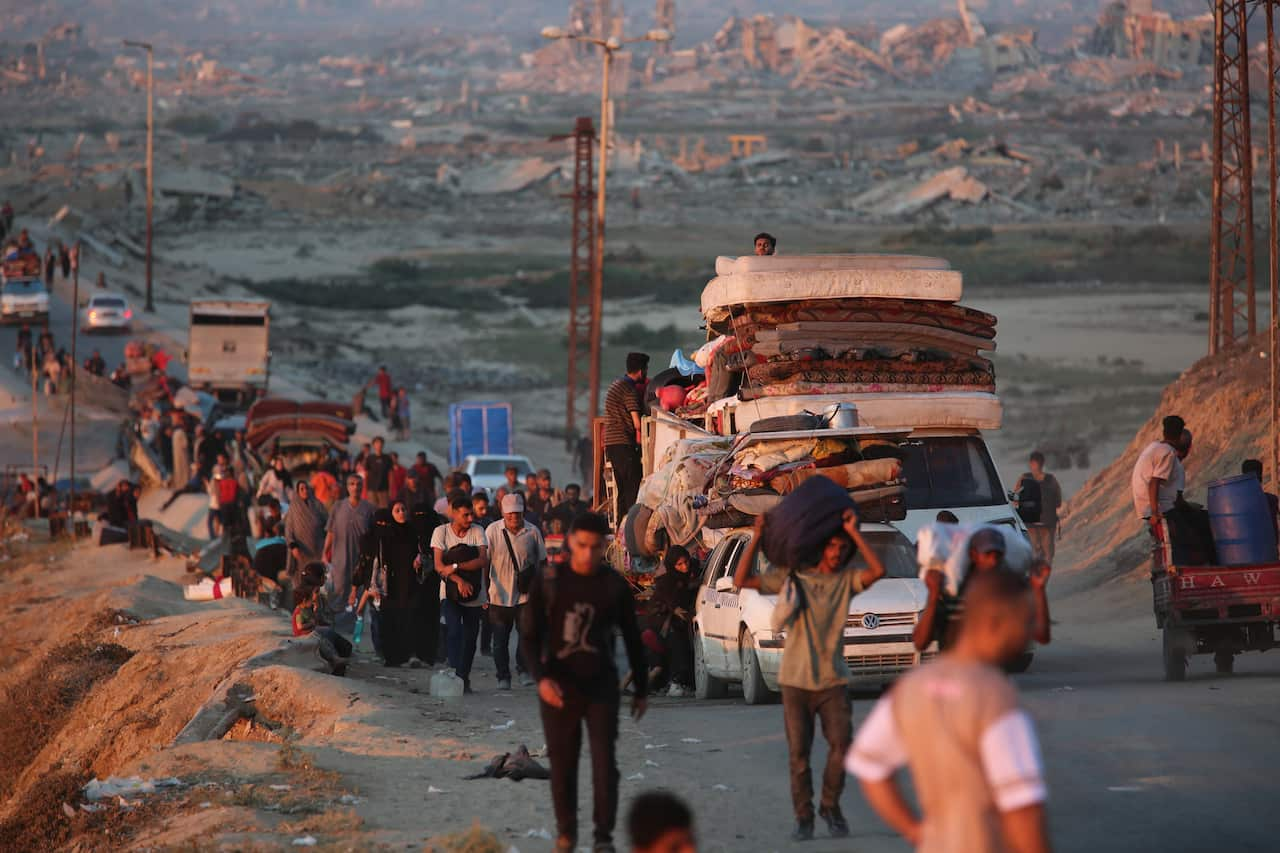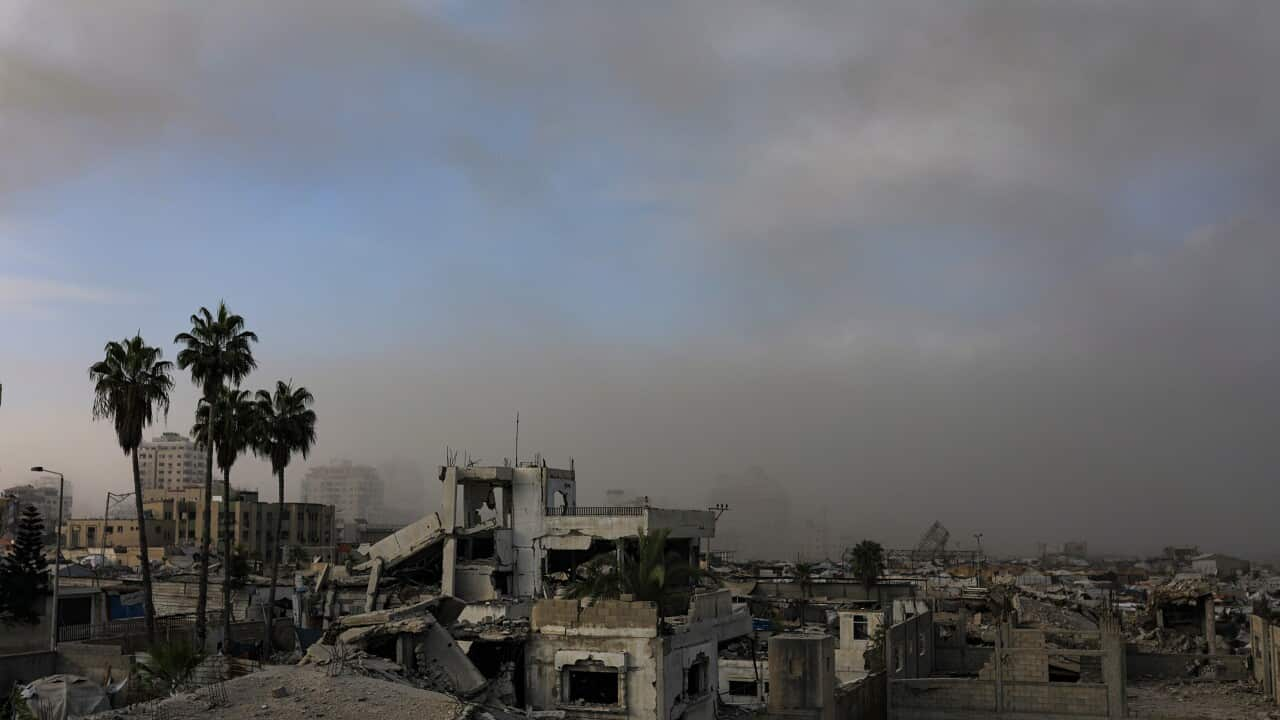Top United States diplomat Marco Rubio began a visit to Israel on Sunday, after expressing the Trump administration's unwavering support for its ally in the war with Hamas despite a strike in Qatar that drew broad criticism of Israel.
The trip is taking place after US President Donald Trump rebuked Israel over the unprecedented attack against Hamas leaders meeting in Doha on Tuesday.
It marked Israel's first such strike against US ally Qatar and has put renewed strain on diplomatic efforts to bring about a truce in Gaza.
Qatar's prime minister dined with Trump and met with Rubio before the latter departed for Israel, while Arab and Muslim leaders are set to meet Monday in Doha to express solidarity with the Gulf state in the aftermath of the Israeli strike.
Before departing for the region on Saturday, Rubio told reporters that, while Trump was "not happy" about the strike, it was "not going to change the nature of our relationship with the Israelis".
But he added that the US and Israel were "going to have to talk about" its impact on truce efforts.
Israel's strike on Qatar — which has been hosting and mediating negotiations aimed at securing a ceasefire in Gaza — targeted Hamas leaders gathering to discuss a new proposal put forward by the US.
Hamas has said five of its members, including a son of its exiled Gaza chief Khalil al-Hayya, were killed in the attack, but its senior leaders and members of its negotiating team survived.
Qatar has said a member of its internal security forces was also killed.
Israeli ambassador to the US Yechiel Leiter said after the operation that if the airstrike failed to kill Hamas leaders, it would succeed next time.
Netanyahu has defended the attack, saying on Saturday that killing senior Hamas officials would remove the "main obstacle" to ending the war.
Hamas has described it as an attempt by Israel to derail the ceasefire negotiations and said it would not change the group's terms for ending the war in Gaza.
Gaza City offensive continues, killing dozens
In recent days, Israel has ramped up efforts to seize control of Gaza City, the territory's largest urban centre, telling residents to evacuate and blowing up numerous high-rise buildings it said were being used by Hamas.
As of late August, the UN estimated that around one million people were living in the city and its surrounding areas, where it has declared a famine it blamed on Israeli aid restrictions. When the famine was declared in late August, Israel dismissed the findings as false and biased.
Bakri Diab, who fled western Gaza City for the south, said Israeli strikes continued there as well.
"All the occupation has done is force people to crowd into places with no basic services and no safety," said the 35-year-old father of four.

Gaza's civil defence agency said at least seven people were killed since dawn Sunday in Israeli strikes in the territory, in addition to 32 people killed by Israeli fire on Saturday.
Israeli strikes killed at least 40 Palestinians in the Gaza Strip on Friday, local health authorities said, most of them in Gaza City, where many residents are staying put despite Israeli evacuation orders because they have nowhere safe to go.
"We are living in constant terror amid relentless shelling and powerful explosions," said Sara Abu Ramadan, 20, a resident of Gaza City.
"Why such massive firepower in these rockets? What's their goal? We are dying here, with nowhere to seek refuge ... and the world just watches. Why so much injustice?"
"The explosions never stopped since yesterday," said father-of-two Adel, 60, who lives in Gaza City close to Beach refugee camp. He did not wish to give his full name for safety reasons.
"Many families left their homes and that is what the occupation wants," he told Reuters via a chat app on Friday. "By these bombardments they are telling people 'You either leave your area or die there'."
The Israeli army said it had completed five waves of airstrikes on Gaza City this week, targeting more than 500 sites, and that it had destroyed reconnaissance and sniper sites, buildings containing tunnel openings and weapons depots.
UNGA backs revival of two-state solution
Also on Friday, the UN General Assembly voted to back a revival of the two-state solution, in defiance of Israeli opposition.
Israeli allies Australia, Britain and France, alongside several other Western nations, are set to recognise Palestinian statehood at a UN gathering this month.
The seven-page declaration is the result of an international conference at the UN in July — hosted by Saudi Arabia and France — on the decades-long conflict. The United States and Israel boycotted the event.
A resolution endorsing the declaration — which also condemned Hamas' 7 October attacks and attacks by Israel against civilians and civilian infrastructure in Gaza — received 142 votes in favor and 10 against, while 12 countries abstained.
French foreign minister Jean-Noel Barrot said the resolution secured the international isolation of Hamas.
"For the first time today, the United Nations adopted a text condemning it for its crimes and calling for its surrender and disarmament," he said in an X post.
The US — Israel's most powerful ally and biggest arms supplier — was among the countries that voted against the resolution, which it described as "yet another misguided and ill-timed publicity stunt" that undermined serious diplomatic efforts to end the conflict.
Ahead of Rubio's visit, a US State Department spokesperson said the diplomatic chief would show "our commitment to fight anti-Israel actions including unilateral recognition of a Palestinian state that rewards Hamas terrorism".
- At least six people killed in shooting at Jerusalem bus stop
- Emaciation, miscarriages and death: An eyewitness account of starvation in Gaza
- Australians on Gaza flotilla say they remain 'steadfast' after alleged drone attacks
In Israel, opponents of the Netanyahu government have sought to pressure ministers to end the war in return for the release of Israeli hostages held in Gaza.
On Saturday, the Hostages and Missing Families Forum, the main campaign group for the captives, accused the Israeli premier of being the "one obstacle" to freeing the hostages.
Of the 251 people taken hostage by Palestinian militants in October 2023, 47 remain in Gaza, including 25 the Israeli military says are dead.
Hamas' 7 October 2023 attack on Israel resulted in the deaths of 1,219 people, mostly civilians, according to an AFP tally of official figures.
Israel's retaliatory campaign in Gaza has killed at least 64,803 people, also mostly civilians, according to figures from the health ministry in Gaza that the United Nations considers reliable.
'Alarming passivity'
Brian Katulis, a senior fellow at the Middle East Institute, said Rubio was unlikely to push Israel toward a ceasefire.
"There is an alarming passivity in actually getting to a ceasefire in Gaza," said Katulis, who worked on Middle East policy under former president Bill Clinton.
"The administration seems to be listening more to its own base of Huckabees and other evangelical Christians allied with right-wing Israelis," he said, referring to the US Ambassador in Jerusalem, Mike Huckabee, a Baptist pastor.
In Jerusalem, Rubio will visit the Western Wall with Netanyahu on Sunday, according to the Israeli prime minister's office. His main meetings with officials, including Netanyahu, will take place on Monday before he departs on Tuesday.
For the latest from SBS News, download our app and subscribe to our newsletter.

